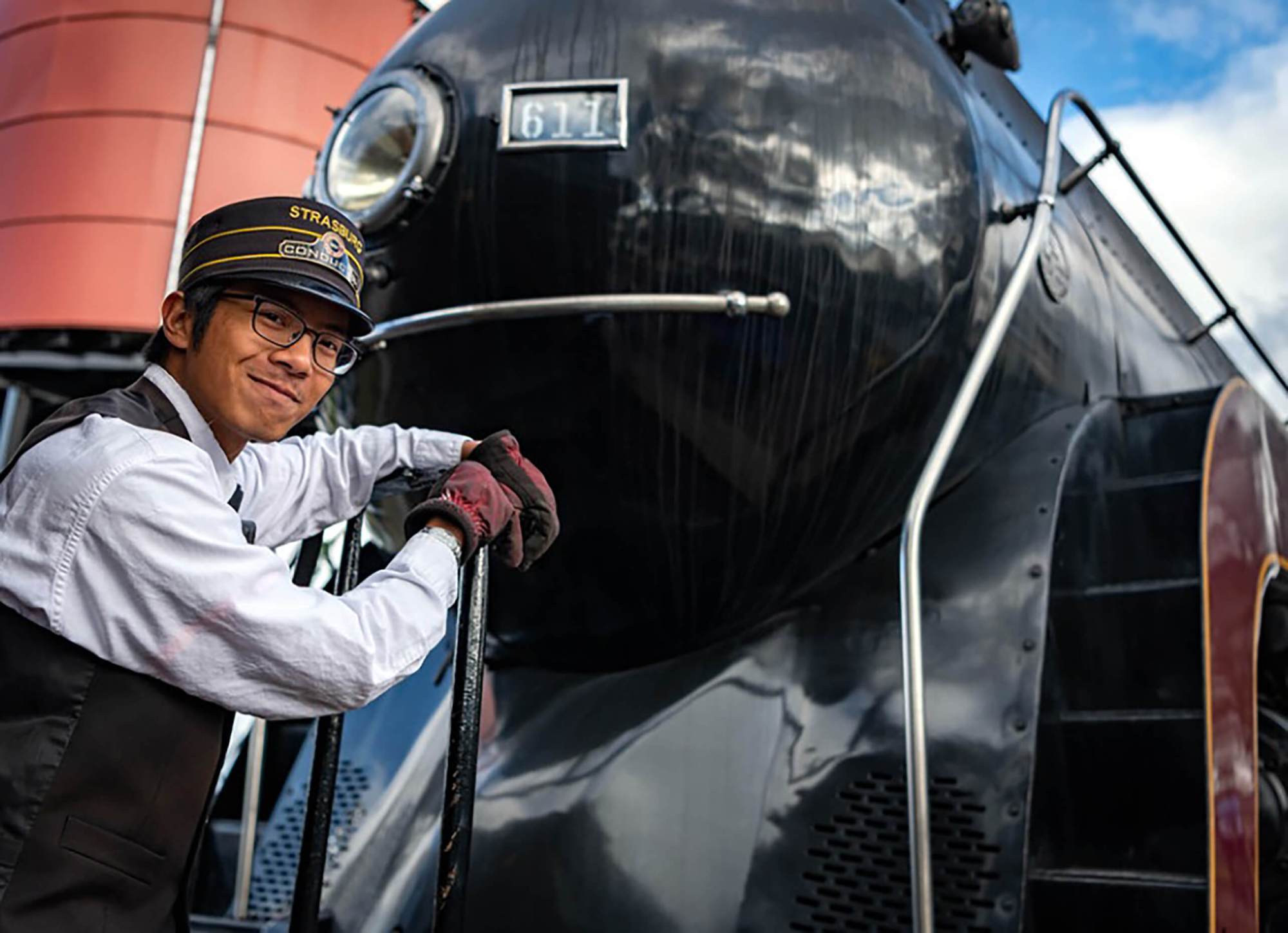HOW TO BECOME A TRAIN CONDUCTOR

The role of a train conductor can be a demanding but rewarding career path. Discover if you have the right interests and skills and if the life of a train conductor is something you’d be able to pursue.
Origin of Train Conductors
The origins of train conductor positions date back to the earliest days of passenger railway history in America. Railroad conductors, recognized by their distinct outfits, became the embodiment of railroad workers by the 1840s.
Train Engineer vs. Conductor
Train engineers and conductors work closely, but their job responsibilities are entirely different. The train engineer is the person in charge of operating the train. They pull the locomotive’s controls, monitor its speed, and observe track signals and signs.
But even though the engineer is in physical control of the train, the train conductor is the one calling the shots. As the “boss” of the locomotive, conductors oversee all paperwork, passengers, cargo, crew, train routes, and more.
What Does A Train Conductor Do?
The role of train conductors is often misunderstood. There’s so much more to their job than collecting tickets and helping passengers board. They are the trains’ managers, who oversee the safety of all passengers, crew members, and train cars by:
- Opening and closing train doors when it’s safe.
- Overseeing the loading or unloading of cargo.
- Coordinating train schedules, yardmasters, and cargo lists with the station personnel, railyard workers, and train engineers.
- Conducting safety checks on all equipment and train cars prior to departure.
- Documenting and flagging any mechanical problems to the engineer before the train leaves.
- Ensuring all passengers and crew members behave safely and assisting both groups as needed during the trip.
- Alerting passengers of upcoming stops.
- Alerting crew members of essential travel and safety information.
- Observing tracks to spot potential obstructions.
- Knowing and adhering to all railroad signs, signals, federal regulations, and instructions from dispatchers, the engineer, and yardmasters.
How To Become a Train Conductor
The route to becoming a train conductor is similar to most trade jobs. To be considered for a role, you’ll need hands-on experience and practical skills that are best learned on the job.
We’ve outlined some of the key skills and requirements railroad companies are looking for in their aspiring train conductors below.
Train Conductor Skills & Requirements
Conductors have a long list of responsibilities, which means they must be skilled, well-rounded individuals. Generally, people seeking train conductor jobs should have the following personality skills:
1. Strong Attention to Details
Aspiring train conductors should be observant. They are responsible for inspecting the train equipment, railway conditions, and potential safety threats, so they must have a keen eye for detail to spot any irregularities that could cause derailment.
They’ll have to manage many different locomotive and train crew schedules, so it’s crucial they can find any gaps or overlaps that could put the train and its cargo in danger.
2. Good Communication
As the captains of the train, conductors must be good communicators. When communication between conductors and other staff members falls through the cracks, delays, derailments, or other dangerous consequences can occur.
3. Time Management
The train industry is punctual. Conductors who work in passenger services or freight travel are responsible for managing timelines and station schedules to ensure the right train reaches its intended destination at the right time.
4. Customer Service
In some ways, train conductors are the “flight attendants” of the railways. Their ultimate goal is to ensure all passengers feel safe and comfortable throughout the trip.
With that analogy in mind, train conductors should have strong customer service skills and be readily available to address any questions, comments, concerns, or complaints that may arise from the moment passengers board until they deboard.
5. Leadership Skills
Train conductors manage the train staff and crew so it’s important they have natural leadership skills. They should understand how to manage different personalities and motivate them to work together.
Train Conductor Training & Physical Requirements
Most railways have 3 minimum qualifications to be considered for a train conductor job:
- Must Have a High School Diploma or GED
- Must be 18 years of age or older
- Must have a Federal Rail Road Association (FRA) Certification
The FRA certification includes a combination of classroom instruction, field training, proficiency exams, and extended on-the-job training. The length of an aspiring conductor’s training can vary based on the size and complexities of the railroad.
Trainees must also pass a brief physical exam to ensure their hearing and vision are aligned with the FRA safety standards.

Life of a Train Conductor
The life of a train conductor can vary based on the type of railway they’re working on. In general, the job can be physically and mentally demanding.
As safety managers, conductors are expected to stay focused and alert throughout their entire shift. They’re responsible for making time-sensitive decisions and managing unexpected incidents as they occur, which can be mentally exhausting.
Each station’s hours and physical requirements are different but could include long hours on the feet, walking, handling equipment, and working in unpredictable weather conditions.
In terms of a social life, many conductors working in freight services contend that the long, and sometimes unpredictable, hours make it difficult to have a family, while others in passenger services defend that it’s still manageable.
Visit Strasburg Rail Road to see a train conductor in action!


 In the railroad industry, the word “hostling” means the process of preparing a steam locomotive for operation. On this tour, guests receive a unique, up-close, and behind-the-scenes view of how a steam locomotive is prepared for the day’s operation. This tour is limited to just 10 people.
In the railroad industry, the word “hostling” means the process of preparing a steam locomotive for operation. On this tour, guests receive a unique, up-close, and behind-the-scenes view of how a steam locomotive is prepared for the day’s operation. This tour is limited to just 10 people.